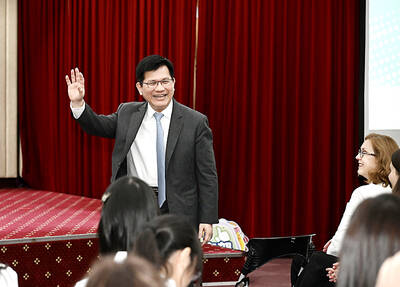BenQ Corp (明基電通), Taiwan's biggest mobile phone maker, yesterday announced that it will acquire Siemens AG's debt-ridden handset unit, aiming to bring the Taiwanese brand onto the world stage.
The deal will turn Taipei-based BenQ into one of the world's biggest cell phone vendors overnight, with annual revenues doubling to a total of US$10 billion, the head of the company said yesterday at a press conference.
"BenQ has been seeking ways to boost its economic scale and manufacturing capabilities to become a leading mobile phone player. We think Siemens is a partner that will be complementary," chairman Lee Kun-yao (
Lee said the company will acquire Siemens' entire mobile phone business, with more than 7,000 employees worldwide, and will have its headquarters in Munich.
In a joint statement issued yesterday, BenQ said it will be acquiring all of Siemens' development and manufacturing locations in Manaus, Brazil and Kamp-Lintfort in Germany. The factory in Shanghai, which is operated as a joint venture together with a Chinese partner, will also remain a development and manufacturing location, it said.
Under the terms, BenQ will also get 250 million euros in cash from the German phone giant to develop patents and market the new brand BenQ-Siemens, according to the company.
Within 5 years after the agreement takes effect in October, BenQ will be able to launch products under the co-brand BenQ-Siemens, the company said. After that, BenQ will run only its own brand, the company added.
Siemens will also spend 50 million euros to get a 2-percent stake in BenQ by purchasing the company's global depositary receipts (GDRs) by September at the earliest, BenQ said in a statement.
As Siemens, the world's No.5 cellphone vendor, will absorb all of the losses incurred before the agreement takes effect, BenQ chief financial official Eric Yu (
With the contribution from Siemens, BenQ's handset shipment will exceed 15 million units this year, up from 10 million estimated previously, Yu said. The company will hold a special shareholders' meeting on July 28 to approve the acquisition deal and the issurance of GDRs.
Vincent Chen (陳豊丰), an analyst with CLSA Ltd (里昂證券) in Taipei, is quite conservative about the acquisition, citing uncertainties.
"It will be a challenge for BenQ to reach the break-even point for the new mobile operation next year as the company hopes. It will be good enough for BenQ to shrink losses from the unit by cost savings," Chen said.
"The only positive part of the deal is BenQ will have no cash offer for Siemens' handset division, but overall, I'm still negative about the acquisition," Chen added.
But Daniel Wang (
"Siemens' offer looks quite positive to BenQ, especially for BenQ's brand business," Wang said. Besides, BenQ will have chance to take over Singapore's Flextronics to make phones in the pipeline, he added.
The key question is how much BenQ can reduce its costs to compete directly with mobile phone giants Nokia Oyj and Motorola Inc, which are slashing prices to gain market share, Wang said.
BenQ shares yesterday lost NT$0.9 to NT$32.5 yesterday on the Taiwan Stock Exchange after the purchase of Siemens' handset division was disclosed on Monday.

FIREPOWER: On top of the torpedoes, the military would procure Kestrel II anti-tank weapons systems to replace aging license-produced M72 LAW launchers Taiwan is to receive US-made Mark 48 torpedoes and training simulators over the next three years, following delays that hampered the navy’s operational readiness, the Ministry of National Defense’s latest budget proposal showed. The navy next year would acquire four training simulator systems for the torpedoes and take receipt of 14 torpedoes in 2027 and 10 torpedoes in 2028, the ministry said in its budget for the next fiscal year. The torpedoes would almost certainly be utilized in the navy’s two upgraded Chien Lung-class submarines and the indigenously developed Hai Kun, should the attack sub successfully reach operational status. US President Donald Trump

Taiwan Semiconductor Manufacturing Co (TSMC, 台積電) is expected to start construction of its 1.4-nanometer chip manufacturing facilities at the Central Taiwan Science Park (CTSP, 中部科學園區) as early as October, the Chinese-language Liberty Times (the Taipei Times’ sister newspaper) reported yesterday, citing the park administration. TSMC acquired land for the second phase of the park’s expansion in Taichung in June. Large cement, construction and facility engineering companies in central Taiwan have reportedly been receiving bids for TSMC-related projects, the report said. Supply-chain firms estimated that the business opportunities for engineering, equipment and materials supply, and back-end packaging and testing could reach as high as

ALL QUIET: The Philippine foreign secretary told senators she would not respond to questions about whether Lin Chia-lung was in the country The Ministry of Foreign Affairs on Wednesday confirmed that a business delegation is visiting the Philippines, but declined to say whether Minister of Foreign Affairs Lin Chia-lung (林佳龍) is part of the group, as Philippine lawmakers raised questions over Lin’s reported visit. The group is being led by Deputy Minister of Agriculture Huang Chao-chin (黃昭欽), Chinese International Economic Cooperation Association (CIECA) chairman Joseph Lyu (呂桔誠) and US-Taiwan Business Council (USTBC) vice president Lotta Danielsson, the ministry said in a statement. However, sources speaking on condition of anonymity said that Lin is leading the delegation of 70 people. Filinvest New Clark City Innovation Park

DEFENSIVE EDGE: The liaison officer would work with Taiwan on drones and military applications for other civilian-developed technologies, a source said A Pentagon unit tasked with facilitating the US military’s adoption of new technology is soon to deploy officials to dozens of friendly nations, including Taiwan, the Financial Times reported yesterday. The US Department of Defense’s Defense Innovation Unit (DIU) is to send a representative to collaborate with Taiwan on drones and military applications from the semiconductor industry by the end of the year, the British daily reported, citing three sources familiar with the matter. “Drones will certainly be a focus, but they will also be looking at connecting to the broader civilian and dual-use ecosystem, including the tech sector,” one source was